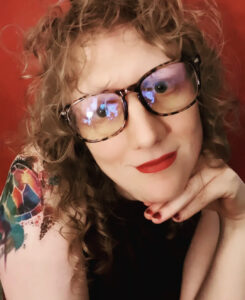 Hailey Piper is the author of novellas The Worm and His Kings, winner of the 2020 Lesfic Award for Best Horror; Benny Rose, the Cannibal King, and her collection Unfortunate Elements of My Anatomy. Her debut novel, Queen of Teeth, releases from Strangehouse Books in summer 2021. She’s an active member of the HWA, with short stories appearing in Year’s Best Hardcore Horror, Daily Science Fiction, Flash Fiction Online, The Arcanist, and elsewhere. A trans woman hailing from New York’s haunted woods, she now lives with her wife in Maryland. Find her on Twitter via @HaileyPiperSays or at www.haileypiper.com.
Hailey Piper is the author of novellas The Worm and His Kings, winner of the 2020 Lesfic Award for Best Horror; Benny Rose, the Cannibal King, and her collection Unfortunate Elements of My Anatomy. Her debut novel, Queen of Teeth, releases from Strangehouse Books in summer 2021. She’s an active member of the HWA, with short stories appearing in Year’s Best Hardcore Horror, Daily Science Fiction, Flash Fiction Online, The Arcanist, and elsewhere. A trans woman hailing from New York’s haunted woods, she now lives with her wife in Maryland. Find her on Twitter via @HaileyPiperSays or at www.haileypiper.com.
What inspired you to start writing?
I’ve always told stories, and part of me wanted to write them down and share them. Bouts of depression aside, once I got started, it was hard to stop. Michael Crichton and Stephen King showed me writing was possible when I was still a child.
What was it about the horror genre that drew you to it?
Monsters have always been my jam to start, but that’s only part of horror. For a long while, I thought I might write fantasy, but everything skewed toward darker fiction. In time, I realized horror gives me healing, and I crave horror’s honesty.
Do you make a conscious effort to include LGBTQ material in your writing and if so, what do you want to portray?
Not so much character-wise. Usually they reveal who they are to me, and my worldview is so queer-oriented that they are who they are. My conscious decision is how much to reveal to the reader. Sometimes a little, sometimes a lot.
What has writing horror taught you about the world and yourself?
Writing horror has connected me with others in a wonderful community. Internally, I’ve learned I have a lot more about myself to understand than I once realized. We are deep creatures, but we have to be willing to dive.
How have you seen the horror genre change over the years? And how do you think it will continue to evolve?
I’ve noticed trends in what’s popular (monsters, slashers, torture, ghosts), but I think under the surface there have always been works of a pure threat, others more subversive, others questioning. I feel we’re seeing more prevalence for more kinds of stories than before. I hope that will continue. More voices, more stories.
How do you feel the LGBTQ community has been represented thus far in the genre and what hopes do you have for representation in the genre going forward?
I feel like I grew up in an environment so drenched in homophobia and transphobia that it still feels like the foundation we’re fighting against, even though queer horror creators have existed so far back, even though we’ve made great progress of late. My hope is we can keep building on that progress, where queer creators no longer have to walk on eggshells over whether we’re being too subtle, too overt, too anything in our art’s queerness. We have a long way to go.
Who are some of your favorite LGBTQ characters in horror?
I love Ore from White Is for Witching by Helen Oyeyemi. She’s brilliant and observant in ways few horror characters ever manage. I also love Gyre from The Luminous Dead by Caitlin Starling, her directness and determination. And for movies, I like Sam from Satanic Panic and Anya from Annihilation. Oh, do the Cenobites count? I feel like they do.
Who are some LGBTQ horror authors you recommend our audience check out?
Everyone knows Clive Barker, Caitlin Kiernan, and Carmen Maria Machado, so I recommend giving a chance to TC Parker, Eric LaRocca, Joanna Koch, Jessica Guess, A.C. Wise, Larissa Glasser, Zin Rocklyn, Laura Mauro, etc. The list could really be endless.
What is one piece of advice you would give horror authors today?
Jot every idea down, no matter how ridiculous, because you never know.
And to the LGBTQ writers out there who are just getting started, what advice would you give them?
Don’t say no to yourself. There will already be people telling you “no, don’t make it political,” as if all art isn’t inherently political, or “no, don’t shove queer stuff in my face,” as if that’s your problem. Don’t join the “no” chorus. You have all this energy to do what you want in your art; let yourself do it.

